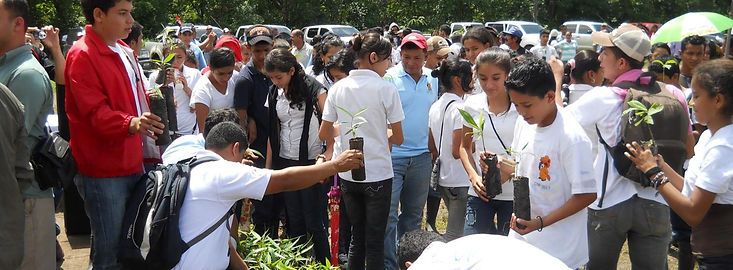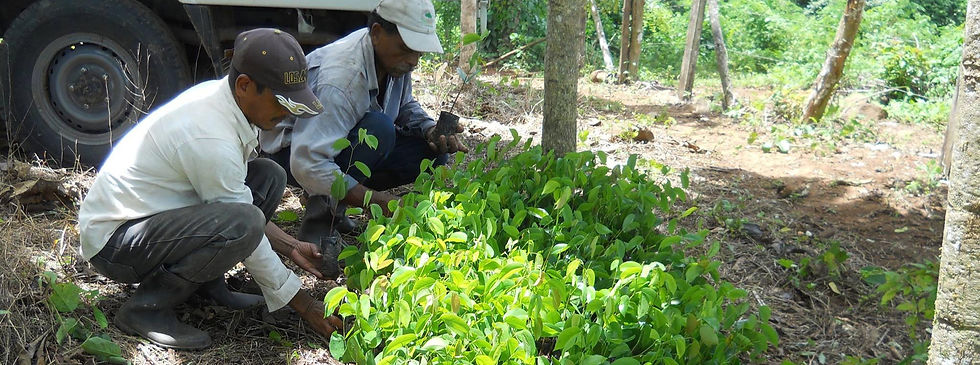
Impact Beyond Carbon
Nicaforest achieves a positive impact on climate and the environment through our reforestation project, which serves as natural carbon storage in addition to promoting the health of the surrounding ecosystem. Through the revenue stemming from carbon, we have established a sustainability platform that aims to encompass tie a benefit to climate, with a positive impact on the community and environment. We believe carbon sequestration should have an impact that extends beyond climate.
Our social initiatives
The Nicaforest reforestation project focuses on two key areas, fostering high-impact initiatives and the creation of a sustainable value chain around the forest. Our social impact platform aims to achieve a positive impact on both of these segments and serves as an example of how carbon sequestration can have an impact beyond our climate. We have developed our social impact platform to encompass the following key segments:

1. Education
Education is the key to the future of sustainable development. Nicaforest is proud to foster education in the community, and in doing so, have a lasting positive impact on development that extends beyond the scope of our high-impact reforestation project. Our initiatives grant opportunities and knowledge to students ranging from primary school all the way to university. These initiatives work in synergy with promoting social development goals such as eliminating poverty and fostering gender equality. Access to education fosters value creation in the community and has proven to play a fundamental role in achieving gender equality. Our initiatives are conducted with the common theme of sustainable development and the important role it plays in the overall development of the region for years to come.

2. Food Security
Food security is a basic requirement for the development of any community, and today, almost 10% of the world’s population suffers from hunger. The Nicaforest project understands the important role food security has in our community, and we are proud to have close to a decade's worth of initiatives that foster food security in the region. Our food security initiatives serve to foster good health and well-being, as well as reduce poverty. This is a result of access to proper nutrition, which is key for both the health of a community and its economic development. In the past, we have engaged in intercrop food production, which allowed the local community to utilize the space between trees to plant and harvest beans for consumption. Additionally, we have placed emphasis on the food security of our workers and their families, with the aim of leading by example on the importance of fostering such an important segment for development. Food security is one of the basic prerequisites for the development of any community and with the overarching goal of improving the nutrition of the local community, Nicaforest is committed to furthering the development of food security in the region.
3. Economic
Decent work and economic growth for all is a fundamental part of the sustainable value chain, as well as a determining factor in improving living standards in a community. The Nicaforest project embraces sustained, inclusive, and sustainable economic growth in all parts of our operations. An example of our impact in this area is the signing of Shared Benefit Agreements signed between Nicaforest and local farmers for plantation sites. This means we do not own the land in which the plantations are located, instead, we lease the land to ensure the value created is for the community, not at the expense of it. Sustainable economic development also achieves a positive impact in fostering gender equality through access to employment opportunities, as well as access to education through an improved economic standing. These farmers get access to the carbon and timber market, providing an economically viable alternative to cattle farmers and fostering the development of a sustainable value chain around the forest. Nicaforest aims to offer a viable economic alternative in a region dominated by cattle farming, fostering sustainable growth through employment opportunities and access to education.


Gold standard for the Global Goals certified
Our reforestation project Nicaforest has long been one of the high-impact projects certified by the Gold Standard Foundation. As of now, we are thrilled to say that we have also received their Gold Standard for the Global Goals certification, as we are contributing to the United Nations' Sustainable Development Goals (SDGs). Reporting on progress will be done in accordance with Gold Standard methodology and is supervised by SustainCERT. SustainCERT is a certification body that provides certification services for carbon credits and other types of environmental credits. They assess and verify the emissions reductions claimed by carbon credit projects, using internationally recognized standards and procedures.

SDG 4. Quality Education
The Nicaforest Reforestation program arranges internships for college and university-level students (between ages 20-24) and working adults (NF employees aged 21-40) on an annual basis. These internships are aimed at enhancing their practical skills in forest management through a learn-by-doing approach, complemented with some theoretical instruction. In order to report our progress we will be collecting data from each of the attendees regarding information such as age, gender, level of education, and degree of knowledge among other things.
We will conduct surveys after years 1 and 2 following the internship workshops or courses. These surveys will allow us to follow up on our established data set thereby letting us quantify and measure our direct impact.

SDG 8. Good Jobs and Economic Growth
The pursuit of fair employment opportunities and robust economic progress for everyone is a crucial aspect of a sustainable value chain. With the Nicaforest project, we are committed to fostering long-lasting, inclusive, and sustainable economic growth across all aspects of our operations. We are going to be measuring our success on SDG 8 by the number of jobs generated, permanent or temporary. We will be using 2011, the start of the Nicaforest reforestation project as a baseline, with zero jobs in the forestry sector. In order to ensure accurate reporting we will be disclosing information about:
1. The total number of employees by employment contract (Full-time or Part-time), by gender.
2. The total number of employees by employment type in the forestry sector (full-time and part-time), by gender, in the municipality where NFP operates.
For this data, we will consult with the Institute of National Forestry (INAFOR) to monitor other registered forestry projects or investments in the corresponding municipalities

SDG 13. Climate Action
Ensuring the health and preservation of our forests is an essential component of promoting the well-being of the entire ecosystem. As part of the initial phase of the Nicaforest project, we have already planted 262,000 trees, leading to a rise in local biomass and a significant positive impact on the environment. To maximize our impact, we employ the Gold Standard methodologies which means we exclusively plant on land that has been deforested for at least 10 years.

Reforestation with an impact beyond carbon mitigation
The Nicaforest reforestation project is committed to tying carbon sequestration with a positive impact that extends beyond climate. Our social initiatives were designed and executed in accordance with the UN Sustainable Development Goals, seeking to add value to the surrounding community in ways that promote sustainable development. Through our four impact segments, Education, Food Security, Watershed Management, and Economic we aim to tackle the basic areas which must be in place in order to achieve sustainable growth. Our goal as a reforestation project is to create a sustainable value chain around the forest and lead by example on the importance of tying carbon sequestration initiatives that foster a positive impact on climate, community, and environment.

